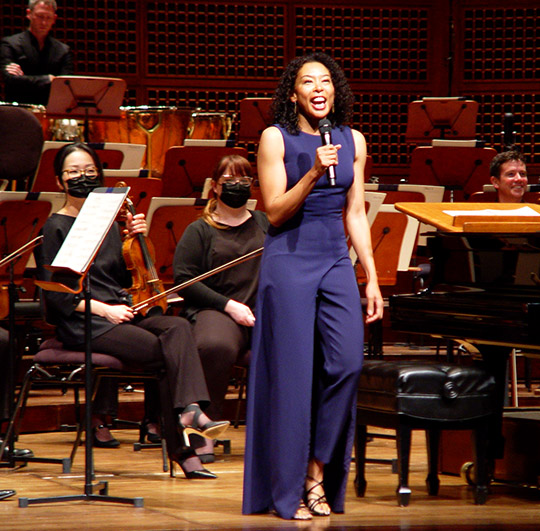Last week's subscription concert at the San Francisco Symphony was disappointing, even though the program looked promising, with two SF Symphony premieres joined by a surpassingly beautiful old chestnut, Dvorak's 9th Symphony, From the New World. Saturday evening started with the composer Nokuthula Ngwenyama's 2020 Primal Message, a ten minute evocation of "the human feeling" behind the interstellar, 186-second radio wave message sent into space in 1974 by Carl Sagan and others. The composer above was in attendance and she was a delight introducing her piece for strings, a harp, and a bit of percussion, but the music itself sounded like an agreeable movie soundtrack rather than a Primal Message. I kept having visions of Jodie Foster and Matthew McConaughey in the 1997 movie Contact.
Florence Price (1887-1953) was an outsider in the American classical music world for the first half of the 20th century by virtue of her gender and race, but she persisted in composing, arranging, and performing music throughout her life, with a few of her works being played by large orchestral institutions. Many of her works not only disappeared from the concert hall after her death, but some of her scores also vanished and are just being physically discovered in old trunks in summer houses. She was the piano soloist in the Chicago premiere of her 1933 Piano Concerto in One Movement, a work that sounds like an interesting mixture of Western Classical music and popular African-American tunes and rhythms. In other words, the music comes from the same time and place as George Gershwin, but from the other side of the color line. The soloist for these performances was composer/pianist Aaron Diehl (click here for his website) and his playing was unusual and exquisite. His encore of a Joplin ragtime piece, Solace (A Mexican Serenade) was soft, slow, ruminative and sounded almost like Philip Glass, one of Diehl's mentors.
At intermission, my concert buddy Austin asked, "With concertos, when the orchestra is drowning out the piano, is that the fault of the composer or the conductor?" My answer: "It depends." In this case, it was definitely the fault of the guest conductor Xian Zhang, currently the Music Director of the New Jersey Symphony.
While visiting Bohemian hosts in Iowa, Dvorak composed his symphony and infused it with African-American and Native American tunes that are both beautiful and carried an important lesson:. "Here, America, this is your music, use it." In 2010, I went to a "Summer in the City" SF Symphony pops concert where Alondra de la Parra conducted "American" music, including Dvorak's Ninth, in a performance so wonderful that I fell in love with the 1893 symphony (click here). My last sentence was snidely woke: "It's nice to see a crack in the door of the Conductors' Boys Club, even though Alondra is still a gender anomaly in our advanced twenty-first century." So it's sad to report that Xian Zhang conducted a terribly mediocre performance of the symphony that was crude, rude and missing any sense of the poetry and felicities that make the work so special. The brass, one of the glories of this orchestra, were too loud and grating throughout, and the conductor didn't seem to have a clue about what makes this music special (Photo above is by Kristen Loken.)





No comments:
Post a Comment